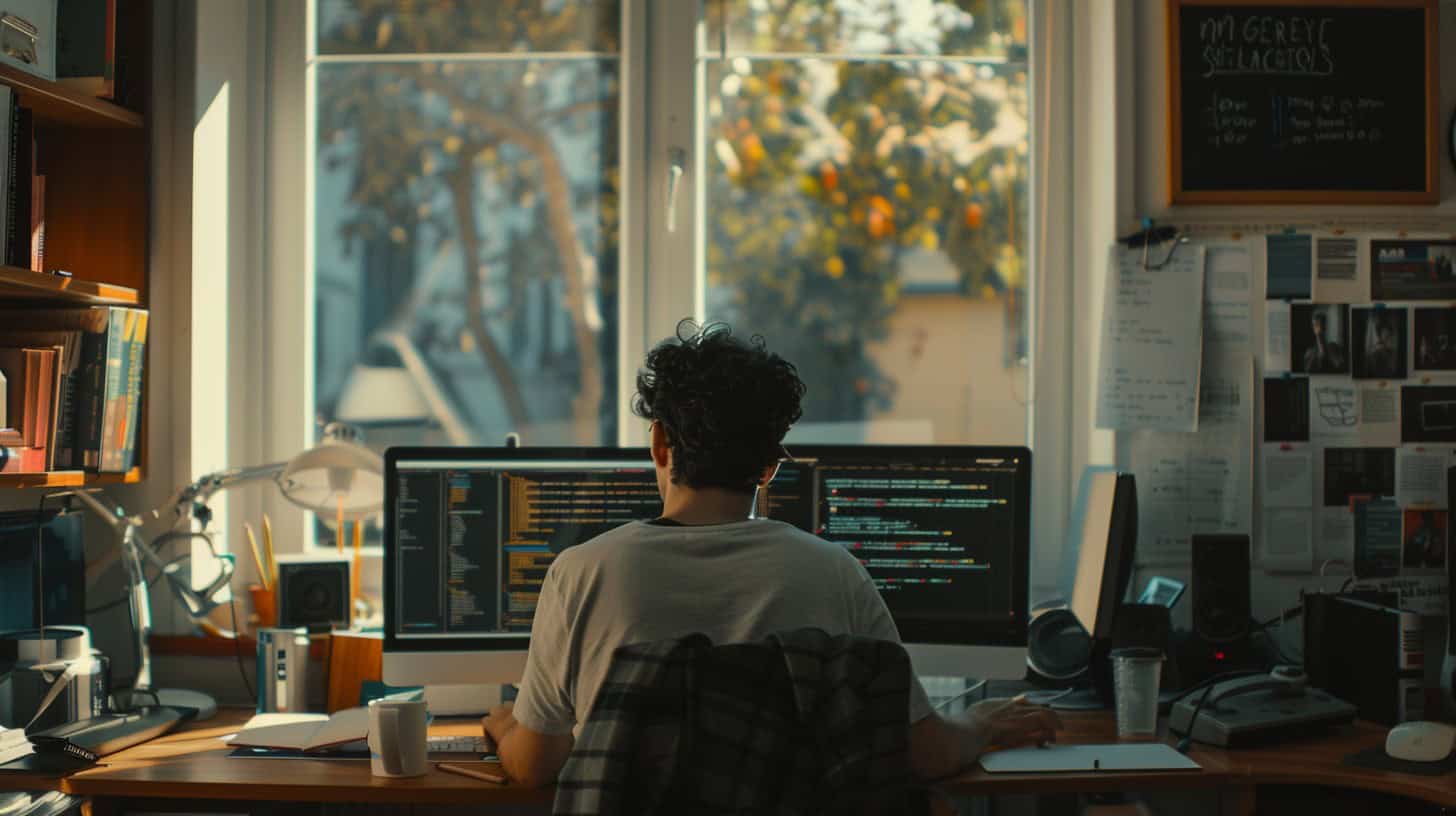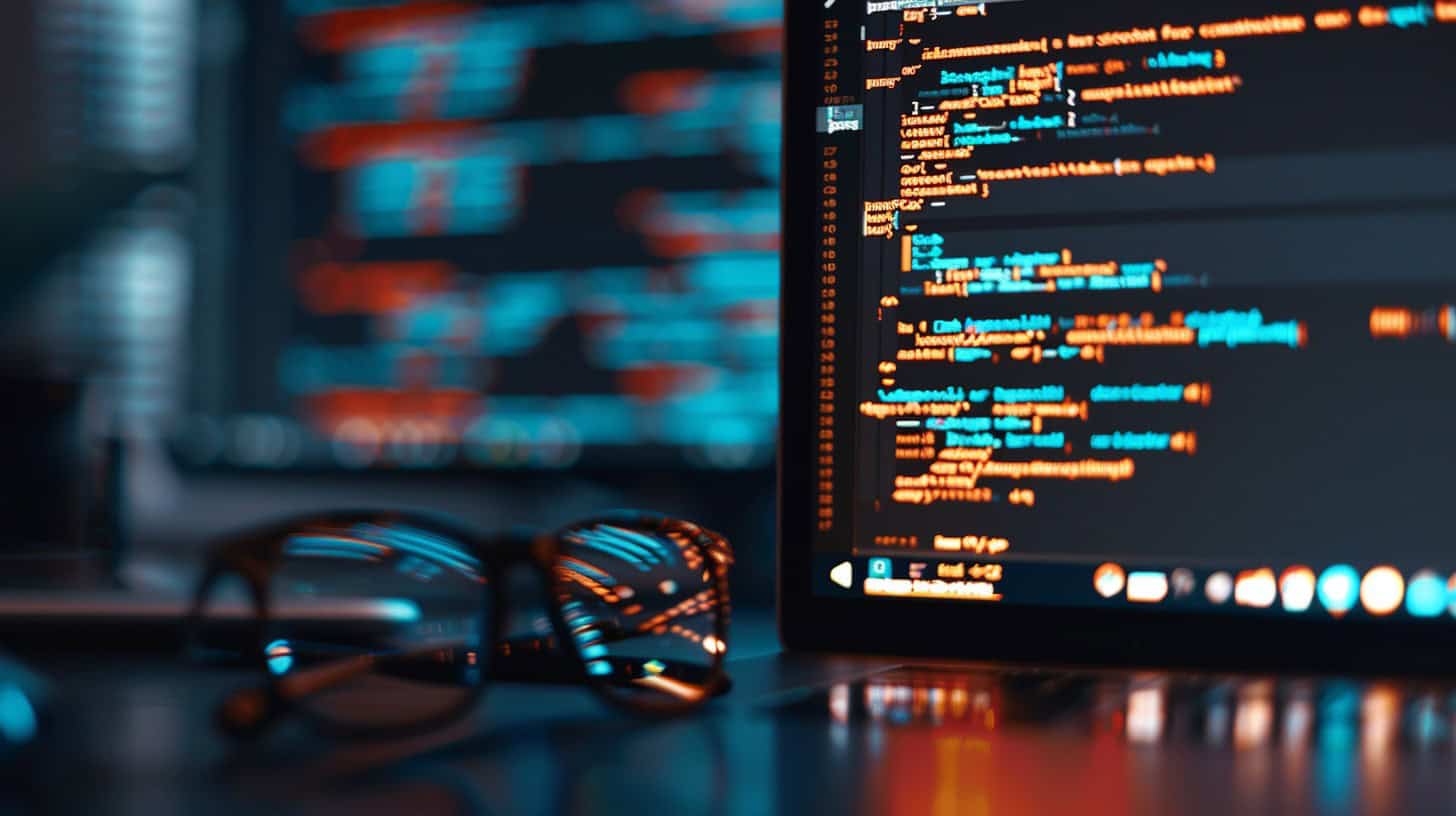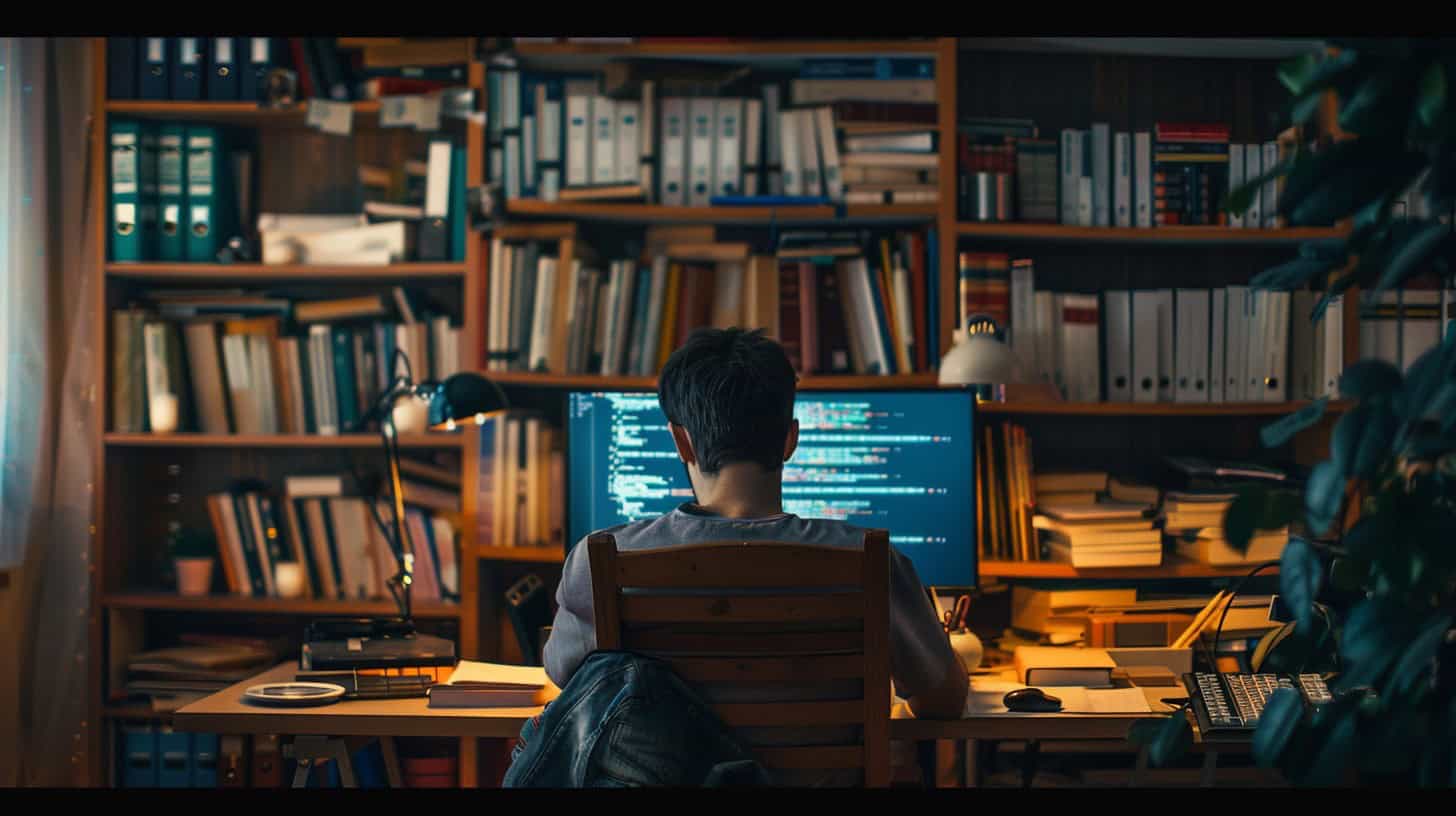Stuck in a coding rut? You’re not alone. Many people feel overwhelmed by the idea of improving their programming skills. This article will guide you through 9 key steps to boost your abilities and make coding less intimidating.
Time to level up!
Key Takeaways
Master the basics of programming first, like understanding loops, variables, and conditions. It’s like learning to read before diving into writing stories.
Practice coding by hand and debugging often to sharpen your problem-solving skills. This approach helps you understand code structure deeply.
Use online resources like GitHub for exploring sample codes from other projects. It’s a good way to learn different coding styles and solutions.
Keep learning new things in programming by joining forums or taking online courses. Tech is always changing, so staying updated is crucial.
Ask for help when stuck and apply your knowledge in real-world projects. Both actions speed up your learning process.
Table of Contents
Understanding the Basics of Programming

Jumping into programming without knowing the basics is like trying to read a book without knowing the alphabet. It’s crucial to get cozy with coding syntax and understand fundamental concepts like loops, variables, and conditions early on.
Importance of Fundamentals
Mastering the basics in programming sets a solid foundation, much like building a house. You wouldn’t start with the roof, right? Starting with fundamentals such as preconditions, algorithms, and data types gives you the tools you need to tackle more complex problems later on.
I learned this the hard way when diving into projects too quickly without a strong grasp of these key concepts. It was like trying to run before I could walk.
A journey of a thousand lines of code begins with understanding the fundamentals.
Exploring coding syntax comes next, and it’s not as scary as it sounds.
Familiarizing with Coding Syntax
Getting comfy with coding syntax is like learning a new language. Just as you need words to form sentences, you use syntax to write code that computers understand. Picture coding syntax as the rules of grammar for any language.
In programming, these rules decide how to write instructions that get jobs done in software.
Start small by writing simple lines of code in an editor designed for writing programs. Use Python or JavaScript at first, since they’re easier for beginners. Pay attention to how we use semicolons, indentations, and brackets.
These might seem small, but mess them up and your program won’t work. It’s like forgetting a period in a sentence; suddenly it doesn’t make sense! Practice fixing errors—known as bugs—to improve quickly.
Remember, every programmer started where you are now!
Essential Tips to Enhance Programming Skills

To get good at programming, you need a solid plan. Dive into practice, and don’t be afraid to ask for directions if you’re lost.
Focus on the Fundamentals
Mastering programming starts with a solid foundation. Nailing down the basics is like learning to ride a bike – tricky at first, but it makes every challenge ahead smoother. Here’s how you can build a rock-solid groundwork in coding:
- Start with the core concepts of programming languages. Think about variables, loops, and conditions as your ABCs. Just like building blocks, you’ll use them everywhere.
- Make friends with algorithms and data structures. They’re not just fancy words; they’re your secret weapons for solving problems more efficiently.
- Coding syntax is another must – know. Each language has its own rules, like grammar in English. Mess this up, and the computer won’t understand what you’re trying to say.
- Dive into online education platforms for interactive lessons. Websites like Codecademy make learning feel like playing a video game.
- Get cozy with a programming environment that suits you. Whether it’s a simple text editor or a full-blown IDE (Integrated Development Environment), pick one that feels right and stick with it.
- Embrace practice coding by hand to sharpen your skills and prepare for job interviews, where whiteboarding is common.
- Debugging is part of the journey, not just fixing mistakes but understanding why they happened. It’s like detective work, where you’re both Sherlock Holmes and Watson.
- Sample code can be your best teacher; dissect it to see successful coding in action.
- Version control systems such as Git help you track changes and collaborate without stepping on each other’s toes—a real-life saver in bigger projects.
Back when I started coding, these fundamentals weren’t as clear-cut for me from day one – I learned their value through trial and error across various projects and languages from Python to JavaScript. One project had me debugging code line-by-line at 2 AM only to find a missing semicolon – talk about learning the importance of syntax the hard way! Another lesson was during my first hackathon; my team abandoned our overly ambitious project scope for something simpler due to our foundation in algorithms, which saved us hours of work and led us to secure third place.
Focusing on these basics has turned daunting tasks into manageable ones, transforming me from an overwhelmed novice into someone who can navigate code with confidence – all thanks to putting fundamentals first!
Learn to Ask for Help
Asking for help shows you’re serious about leveling up your coding skills. It might feel tough to do, but reaching out to mentors or heading to forums like Stack Overflow can open new doors.
Imagine hitting a brick wall with a piece of code. Instead of spinning your wheels, you could post a question online and get answers from people who’ve been there. This approach not only saves time but also introduces you to different ways of thinking.
According to devcom.com, programmers who ask questions tend to grasp concepts faster than those who go at it alone. Think about it; if you’re stuck on understanding an API documentation or can’t figure out why your loop isn’t working as expected, someone out there holds the key.
By seeking advice, you gain access to solutions that can make your code cleaner and more efficient. Plus, tools like code audit services offer another layer of support by evaluating your work against industry standards.
A problem shared is a problem halved.
Apply Knowledge Practically
After you’ve learned the importance of asking for help, it’s time to put what you’ve learned into action. This means turning your new knowledge into real-world code. Here is how you can make your programming skills sharp by applying them practically:
- Start small with personal projects. Pick something that interests you or a problem you want to solve. For me, creating a simple budget tracker helped me understand loops and conditionals better.
- Break down big projects into smaller tasks. If you’re building a website, start with the homepage before moving on to other pages. This approach makes complex projects less scary.
- Contribute to open-source projects once you’re comfortable with coding basics. Websites like GitHub are good places to start. You learn a lot by reading others’ code and contributing your own solutions.
- Test your code often. Automated tests save time and help ensure your code works as intended. I once spent hours on a bug that could have been caught early with simple tests.
- Participate in hackathons or coding challenges online. These events are fun ways to learn new things and meet other programmers. My first hackathon experience taught me more about teamwork than any course could.
- Seek feedback through code reviews from more experienced developers. They can point out improvements and teach you best practices. Remember, every piece of feedback is an opportunity to grow.
- Refactor old projects as you learn new techniques or concepts, like design patterns or algorithms. It’s satisfying to see how far you’ve come when you improve an old project with new skills.
- Use debuggers instead of print statements for troubleshooting bugs in your code more effectively; this was a game-changer for me as I moved onto bigger projects.
- Finally, keep learning and experimenting with new languages or frameworks, even if they seem tough at first glance. Moving from Python to Spark was challenging but rewarding for my data processing skills.
By actively working on projects, tackling challenges bit by bit, and always seeking growth opportunities, programming becomes not just about writing code but solving puzzles creatively and efficiently.
Practice Coding by Hand
Once you start applying what you’ve learned practically, grab a pen and paper. Coding by hand is not just old school; it’s your secret weapon in job interviews and helps sharpen your precision.
Sure, it might feel slow at first. But here’s the magic: without autocomplete or syntax highlighting to lean on, you’ll learn the structure of code inside out. This method forces you to think more deeply about logic and problem-solving.
I recall sitting down with nothing but a notebook and a problem to solve. It took me ages to write a simple program that way. Yet, those hours were invaluable. They taught me patience and gave me a deeper understanding of programming fundamentals like loops, conditions, and variables—no distractions from Internet tabs or notifications, just me and the raw code.
Trust me; this approach will make you a stronger coder.
Utilize Online Coding Resources
Jump into the vast sea of coding resources online. Sites like GitHub are gold mines where you can review other coder’s projects. This offers a peek into different coding styles and problem-solving methods.
It’s like having a free ticket to see how others play the game of programming. From beginner exercises to advanced challenges, everything is at your fingertips. Use these platforms to sharpen your skills daily.
Online courses and tutorials also pack a punch in skill building. They bring complex concepts down to bite-sized lessons that fit into busy schedules. I’ve spent countless evenings tinkering with code editors and getting hands-on with automated testing tools through these resources.
The best part? You learn from mistakes without fearing them, because hey, there’s always a reset button! Now, let’s shift gears towards understanding debugging in programming.
The Importance of Debugging in Programming

Debugging is like being a detective in the world of code. It’s crucial because it helps find and fix mistakes fast, making programs run smoothly.
Understanding Code Debugging
Debugging in programming is like being a detective. You hunt for clues to solve the mystery of why your code isn’t working right. Think of it as a puzzle where each piece fits together in just the right way.
Sometimes, finding the missing piece means going step by step, checking each part of your code carefully.
Debugging is about thinking critically and asking why things are happening.
You must know your tools well, such as linters which help clean up your code or debuggers that let you pause and inspect what’s happening line by line. It’s also crucial to build a strong mental model of how your program should work.
This means knowing what each part does and how changes affect the whole system. Practice makes perfect here; the more bugs you chase down, the sharper your skills get.
Knowing When to Take Breaks
After mastering the art of debugging, taking breaks might seem like a minor detail. Yet, it’s crucial for keeping your brain sharp and ready to solve problems. Imagine hitting a brick wall with your code.
Everything looks fine, but still, something’s off. That’s when you step back, take a breather, and let your mind reset. I learned this the hard way during a late-night coding session where no amount of coffee could replace what my brain really needed: rest.
Stepping away helps more than most realize. It prevents feeling swamped or stressed out from staring at screens too long. Think about it as pressing the pause button on a movie; when you come back, you catch details you missed before.
This approach keeps mental clarity in check and ensures focus remains on point without letting frustration build up to boiling levels.
Techniques for Efficient Debugging
Taking breaks is crucial, but knowing how to tackle the bugs in your code is what makes you stand out. Let’s roll up our sleeves and dive into some efficient techniques for debugging that won’t just clear the bugs but also sharpen your problem-solving abilities.
- Start Simple: Don’t jump into the deep end right away. Begin with the basics. Check for syntax errors or missing semicolons. It’s often the smallest stones that trip us up.
- Use Print Statements: Sometimes, old school is cool. Print statements help you track how far your code runs before it hits a snag. It’s like leaving breadcrumbs in a forest; they’ll guide you back to where things went wrong.
- Leverage Debugging Tools: Get familiar with tools designed for this very purpose. Whether it’s GDB for processing units or Chrome DevTools for web design, these tools offer a magnifying glass over your code’s behavior.
- Keep an Eye on Variable Changes: Variables change hands like relay batons in a race. Use a debugger to watch these variables closely. You might find one not passing the baton correctly.
- Break It Down: If tackling the whole program at once feels like wrestling an octopus, break it down. Divide your code into sections and test each part individually. Smaller battles are easier to win.
- Seek Feedback: Two heads (or even three) are better than one, especially when you’re stuck staring at your screen for too long without blinking, hoping for an epiphany. Ask peers or mentors to review your code; fresh eyes might catch something you missed.
- Embrace Version Control Systems: Git isn’t just for tracking changes; it’s a time machine. If new changes introduce bugs, roll back and compare with earlier versions of your code to pinpoint when things went awry.
- Understand Your Code’s Architecture: Before you can fix a problem, you need to understand how everything fits together – from abstract data types to APIs and beyond, coding standards ensure everything communicates well inside this architecture.
- Remember Regular Practice: Just as musicians practice scales daily, programmers must debug regularly to improve their skills naturally over time without realizing it until one day – voilà! – debugging becomes second nature.
- Stay Patient and Positive: Debugging can feel like finding a needle in a haystack made of needles itself sometimes — frustrating and prickly work that demands patience and positivity, especially when today’s problem seems no closer to being solved than yesterday’s.
Each of these strategies came from real moments of frustration, facepalming, and eventual triumphs in front of my computer screen navigating through endless lines of code trying to make sense of why my seemingly perfect creation refused to cooperate as if it had its own agenda against logic itself!
So next time your program decides not to play nice, remember — debugging is less about battling rogue software and more about understanding its needs, patiently guiding them towards functioning harmony within the digital world we continue expanding every day.
Exploring Sample Code

Diving into sample code is like finding treasure in programming. It shows you how others solve puzzles with code, offering clues to improve your own skills.
Importance of Reading Sample Code
Reading sample code gives you a front-row seat to solving actual problems. You see how others tackle challenges and make things work. It’s like learning cooking from a chef by watching them in the kitchen, not just reading recipes.
You get to observe their techniques and then try them out yourself. This approach sharpens your skills, making you a better programmer.
Playing with existing code examples is also key. Think of it as playing with LEGO bricks; you start with what’s there and then add or change pieces to see what happens. This hands-on experience teaches you a lot about construction and creativity in programming.
Plus, it’s fun! Who knew learning could feel like playtime?
Learn from Existing Code Examples
After peeling back the layers on why reading sample code matters, let’s jump into how learning from existing code examples can turn the dial-up on your programming skills. Tapping into others’ code is like finding a map where X marks the spot of buried treasures.
- Start simple. Pick code snippets that match your current level. It’s like picking a book you can actually enjoy reading without getting a headache.
- Modify the samples you find. Change variables or add new features. It’s like customizing your bike to see how it affects the ride.
- Hunt for patterns and structures in the code. Keep an eye out for loop invariants or design by contract principles hidden like Easter eggs in the lines of code.
- Write notes about what you discover. Maybe you’ll notice how getters and setters play nice with each other, or spot a clever use of recursion.
- Compare different solutions to the same problem. It’s as if you’re tasting different cookies to figure out which recipe tastes best.
- Look at feedback or comments on open – source platforms. Learning from discussions is like overhearing tips at a coffee shop that make your next cup even better.
- Pay attention to naming conventions used by experts. Good names make code easier to follow than a well-lit path in the woods.
I remember when I first dug into open-source projects on GitHub, feeling lost in a jungle of genius minds at work was overwhelming yet electrifying! Analyzing their methods gave me insights no tutorial could offer, feeling almost as if I were gossiping with these programmers over virtual coffee breaks.
By using these steps as guideposts, programmers can uncover wisdom woven within lines of code, transforming them from spectators into maestros orchestrating their symphonies of software melodies with confidence and creativity nurtured through practical exploration and intellectual curiosity—programming becomes not just a task, but an art form refined with every piece of shared human knowledge examined under their keen eyes and nimble fingers.
Practice by Modifying Sample Code
Playing with sample code is like getting a treasure map. It guides you, but finding the treasure depends on how well you explore.
- Find a piece of sample code in your area of interest. This might be from an open – source project or coding forums. Open-source projects are gold mines for learning.
- Read through the code thoroughly. Try to understand what each part does. This is where your critical thinking shines.
- Start small by changing variable names. See how these changes affect the program’s behavior.
- Modify existing functions next. Change how they work or what they do. This step will teach you about cause and effect in programming.
- Add new features to the sample code. Think about what could make the program better or more interesting.
- Break the code on purpose, then fix it. Breaking things might seem odd, but it’s a fast way to learn debugging skills.
- Compare your modified version with the original version regularly to see how far you’ve come.
- Share your modified code with others in online communities or coding groups like GitHub or Stack Overflow for feedback.
- Reflect on the feedback and use it to improve further.
Each step helps build your skills in not just writing codes, but understanding deeper concepts like software quality and debugging practices—key pillars in programming mastery.
Remember, every pro was once just a beginner looking at someone else’s code wondering, “How does this magic happen?” Now, go turn that sample code into your own kind of magic!
The Role of Continuous Learning in Programming

In programming, keeping your brain sharp is key. Think of it like leveling up in a video game; new levels bring new challenges and skills. With tech always changing, you’ve got to stay on your toes.
From mastering the latest programming languages to figuring out complex problem-solving, there’s always something new around the corner. Dive into forums, chew on fresh code examples, or get lost in the newest tech articles—every bit helps you grow as a coder.
Joining coding discussions can open doors you didn’t even know existed! So keep learning—you never know what amazing project will come next from staying curious.
Stay Open to New Ideas
Tech keeps changing. New tools like AI-driven software and secure-by-design platforms pop up all the time. They reshape how we think about code quality, vulnerabilities, and development cycles.
To stay ahead, you need an open mind. Think of it as keeping your mental doors unlocked and windows open, letting fresh ideas breeze in.
Always be ready to learn something new; that’s how growth happens.
I learned this firsthand when I jumped from using traditional databases to exploring spark/ada for big data processing. It was a leap – swapping familiar grounds for uncharted territory.
Yet, this shift opened my eyes to the power of computing in ways I hadn’t imagined before. By staying curious and embracing changes in tech landscapes like processors and type systems, I discovered innovative solutions to old problems.
This journey taught me that adaptability isn’t just useful; it’s crucial in our field.
Regularly Update Yourself with Latest Programming Trends
Tech changes fast. Really fast. One day, you’re mastering a coding language; the next, there’s a new framework on the block. It’s like trying to hit a moving target while blindfolded.
That’s why keeping up with programming trends isn’t just helpful; it’s crucial. Check out blogs, watch tutorials online, and join webinars whenever you can. These resources are gold mines for learning about fresh ideas and tech tools that can make your code cleaner and your projects more efficient.
I learned this lesson the hard way during one of my projects. I stuck to what I knew best, and suddenly, my methods were outdated. It wasn’t until I began attending coding meetups and engaging in forums that I caught up with newer practices transforming software development life cycles for the better.
Trust me; it pays to be curious and proactive in learning about advancements such as secure by design principles or how end-to-end tests save time in spotting bugs early on.
Next up: Tackle challenges head-on but smartly – here’s how.
Engage in Coding Discussions and Forums
Jump into coding discussions and forums to kick your skills up a notch. It’s like stepping into a gym where every conversation strengthens your programming muscles. By chatting with others, you apply what you know in real-life situations.
This isn’t just about typing away in solitude; it’s about sharing, debating, and sometimes even defending your code solutions.
I once got stuck on a tricky problem involving memory management. So, I posted my dilemma on an online forum. The flood of suggestions that came back was overwhelming at first. But among those responses were golden nuggets of advice that not only solved my issue but also taught me new ways to approach similar problems in the future.
These platforms are gold mines for learning from peers who’ve walked the path before you or are walking it alongside you now.
Overcoming Challenges in Programming

In programming, hitting a brick wall is part of the journey. Keep calm, break problems into smaller pieces, and soon you’ll find your way through the maze.
Dealing with Complexity
Tackling complicated problems in programming often feels like trying to untie a giant knot. You pull at one string, hoping it’ll loosen everything else, but find another tight spot instead.
I’ve been there, hands-on keyboard, staring at lines of code that made my head spin. The trick? Start small. Break down the mountain into pebbles you can actually move. Just like dissecting a complex math problem into simpler parts helps clear the fog, doing this with code turns “impossible” into “I can do this.”.
One time, I bit off more than I could chew with a project involving momentum conservation. At first glance, the task seemed insurmountable—like teaching a cat to text message! However, by dividing the work into smaller chunks and tackling each piece methodically, what was once daunting became manageable.
This approach not only helped me solve the puzzle but also taught me invaluable lessons about patience and focus in programming’s intricate dance of logic and creativity.
Managing Time and Productivity
Managing time and productivity is like juggling. You have to keep all your balls in the air without dropping any. Focusing on the basics helps you not waste time on things that don’t matter much.
If something’s tough, ask for help instead of spinning your wheels. It’s smart to step away from debugging every once in a while, too. A quick break can clear your head, making you more productive when you dive back into code.
Time management and productivity are two sides of the same coin.
Running and tinkering with sample code are great ways to learn fast without getting bogged down. It’s like having a map when exploring new territories; it guides you through complex parts so you won’t get lost.
This approach makes managing your schedule easier because understanding deep programming concepts takes less time.
Coping with Frustration and Setbacks
After mastering time and productivity, hitting a wall with programming challenges can feel like a setback. But here’s the kicker: these bumps in the road are actually stepping stones to becoming better.
Engaging with sample code, for instance, not only sharpens your skills but also helps you stand tall against frustration. Picture yourself diving into coding puzzles or joining hackathons; it’s like going to the gym for your brain.
Take breaks when debugging turns tough; this simple step keeps stress at bay and clears your head for fresh ideas. Mixing up self-learning with formal computer science education gives you both freedom and structure in tackling programming hurdles.
Remember, every coder started somewhere, facing similar frustrations. The trick lies in persistent practice and finding joy in small victories along the way—like finally squashing that bug that’s been eluding you for days!
Nurturing the Right Mindset for Programming

In programming, having the right attitude is like keeping your garden healthy; you need patience and a lot of curiosity. Keep learning new tricks and don’t let failures stop you from trying again.
Cultivate Patience and Persistence
Mastering patience and persistence is like keeping your cool during a tricky debugging session. Imagine staring at your screen, code sprawled out like a complex puzzle. You hit roadblocks, sure, but giving up isn’t in your playbook.
Instead, you take deep breaths, break down the problem into manageable bits, and keep chipping away. This approach doesn’t just apply to fixing bugs; it’s how you grow as a programmer.
My journey had its share of ups and downs. I remember tackling coding challenges on platforms like LeetCode. At first, I felt lost in a sea of algorithms and data structures. But here’s what made a difference: sticking with it day after day—even when progress seemed slow.
The thing about programming is that every error message teaches you something new if you’re willing to listen and learn from it rather than letting frustration get the best of you.
Foster Curiosity and Creativity
To get better at coding, you need to keep asking “why” and “what if”. This curiosity leads to deeper understanding. I once spent hours tweaking a bit of sample code just to see what would happen.
It was like magic when I finally got it to do something new. That’s the heart of creativity in programming. You tinker, play, and sometimes break things to learn.
Learning from others can also spark your creativity. Have you ever asked for help and gotten an idea that never crossed your mind? Happens all the time in coding forums and discussions with peers.
Sharing knowledge isn’t just about getting answers; it’s about seeing problems through someone else’s eyes. That shift in perspective can be all it takes to turn a dead-end project into something amazing.
Avoid Arrogance and Embrace Humility
Keeping your mind open after fostering curiosity and creativity leads us straight to an essential mindset shift. Arrogance in programming is like adding the wrong code—it just doesn’t compile correctly.
Humility, on the other hand, fits perfectly into every line of code you write. It’s the secret sauce that makes learning from mistakes not only possible but powerful.
Developing software isn’t a solo journey. Even seasoned programmers need feedback and advice. Acknowledge that everyone’s got something to teach you, whether they’re a colleague or someone you meet in online forums discussing privacy enhancements or debugging techniques.
Let your guard down and listen more than you speak; it opens up a world where collaboration improves functionality and simplifies complex tasks like refactoring codes or enhancing security measures.
Remember, those early days on clunky systems taught us perseverance, mapping directly back to humility as a cornerstone for growth in this ever-changing tech landscape.
How to Leverage Networking in Programming

In programming, making friends can give you a big lift. Join coding groups online and share what you know on forums like GitHub or Stack Overflow. Chat with other coders at meetups or hackathons to learn new tricks and find folks to work on projects together.
It’s all about who you know and how much you’re willing to share and learn—so don’t be shy! Keep reading for more ways to boost your coding skills today.
Opportunities in Coding Communities
Jumping into coding communities opens doors you might not know existed. You get to rub elbows with folks who share your passion for writing computer programs. It’s like finding your tribe in the vast digital landscape.
These places are buzzing with people eager to trade knowledge, challenge each other, and push the boundaries of what’s possible with code. From online forums to local meetups, there’s a spot for everyone looking to grow.
Participating in coding competitions is another game changer. Here, you’re not just showing off your skills; you’re testing them in real-world scenarios that require sharp thinking and quick fingers on the keyboard.
It’s like taking all those hours of practice and putting them to use in a marathon that rewards creativity and problem-solving prowess. Plus, it’s a fantastic way to see how you stack up against others and learn new tricks along the way.
Learning from Peers and Mentors
Getting better at programming isn’t a solo journey. Tapping into the wisdom of peers and mentors can turn tricky puzzles into clear solutions. Here’s how diving into this treasure trove of knowledge can boost your skills:
- Join coding communities on the internet. Sites like GitHub or Stack Overflow are buzzing with programmers eager to share advice, code reviews, and support.
- Attend workshops and meetups. These gatherings offer live coding sessions, talks by seasoned developers, and a chance to ask questions in real-time.
- Pair programming is a game-changer. Work alongside someone more experienced and watch how they solve problems, write code, and debug.
- Seek out a mentor who fits your learning style. Whether it’s formal training or casual guidance over coffee, find someone whose expertise aligns with your goals.
- Don’t be shy; ask questions. Whether it’s in forums or face-to-face, questioning is how you fill gaps in your knowledge.
- Share your own knowledge too. Teaching others what you know reinforces your understanding and identifies any areas you need to revisit.
- Collaborate on projects with others at a similar learning stage or with more experience. This hands-on experience is invaluable for growth.
- Review code together with friends or colleagues regularly to learn different approaches to problem-solving and improve code readability.
- Embrace feedback from peers and mentors alike without taking it personally. Constructive criticism is key to becoming a better programmer.
- Social media platforms like LinkedIn can open doors to connect with industry leaders who often share insights, trends, and motivational stories about their journey in programming.
Navigating the vast world of programming becomes less intimidating when you have allies guiding you through it!
Sharing Knowledge and Collaborating on Projects
Sharing knowledge and teaming up on projects can take your programming skills to the next level. It’s like mixing different ingredients to bake the perfect cake — each one adds value.
- Join online forums and coding communities. I once found a solution to a bug that had been bothering me for weeks, all thanks to a tip from someone halfway across the world! These places are treasure troves of information and support.
- Participate in hackathons or coding challenges. It’s thrilling! You get to meet like-minded folks who are just as passionate about creating something cool or solving complex problems. Plus, the adrenaline rush is unbeatable.
- Start a group project with friends or colleagues. This was how I learned the significance of version control tools like Git. Collaborating made us realize how essential it is to manage changes and work efficiently together.
- Share code snippets or whole projects on platforms like GitHub. Don’t just upload your work; look at what others have done too. It’s surprising how much you can learn by reading someone else’s code.
- Offer help to others when they’re stuck. There was a time I helped someone debug their program, and in the process, I picked up a new debugging technique myself!
- Attend workshops or seminars together with peers. These gatherings are not just about listening; they’re opportunities to discuss what you’ve heard, ask questions, and get different viewpoints.
- Pair program with another programmer. It might seem odd at first — two people at one computer? But believe me, it’s an effective way to catch mistakes early and learn from each other’s thinking process.
- Create a study group focused on specific programming languages or technologies you’re interested in learning more about. When we tackled learning Python as a group, it was easier since we could divide topics among ourselves then teach each other.
- Teach a coding class or workshop if you feel confident enough in your skills—sharing knowledge solidifies your understanding and helps beginners out immensely.
- Critique code constructively within your network.Notice how I didn’t say criticize? Offering constructive feedback helps everyone grow without feeling discouraged.
Teaming up isn’t just about working with others; it’s an adventure where everyone brings something unique to the table, making the journey of learning programming much more enjoyable and fruitful for all involved.
The Future of Programming

As technology races ahead, programming is not just about code anymore. It’s a blend of innovation, solving big problems, and adapting to new tools like artificial intelligence and quantum computing.
Upcoming Trends in Programming
Programming is like surfing; you need to catch the wave at the right time. Artificial Intelligence and Machine Learning are these waves that are getting bigger each day. They’re not just buzzwords anymore, but real tools that solve problems and make things smarter, from your phone apps to cars that drive themselves.
Keeping an eye on AI and ML can put you ahead in the game.
Then there’s Quantum Computing, sounding like something out of a sci-fi movie, but it’s here and growing fast. It’s going to change how we solve big puzzles, making our current computers look like old calculators.
Staying adaptable in this changing tech landscape means jumping onto trends such as these, always ready to learn something new or tackle a fresh challenge.
Importance of Adaptability in Changing Tech Landscape
As tech trends shift, staying adaptable becomes key. Mastering new programming languages and tools is like adding more arrows to your quiver. I once had to switch from a familiar framework to an entirely new one mid-project.
It was daunting, but flexibility turned it into a triumph. This taught me that in the tech world, change is the only constant.
Keeping up with updates in software development practices or jumping into forums can fuel growth. For instance, when virtual reality started becoming big, I dived headfirst into learning its codebase despite having zero background in it.
The move paid off massively for my projects down the line. Adapting isn’t just about survival; it’s about seizing opportunities to lead and innovate before others do.
FAQs About How To Get Better At Programming
What’s the first step to getting better at programming?
Dive into the basics like a duck to water. Mastering pre-conditions, postconditions, and understanding conserved quantities in your code is like learning to ride a bike – once you get it, you’ll never forget.
How important is it to understand complex concepts like quadratic time?
It’s as crucial as knowing why your socks always disappear in the laundry! Grasping quadratic time helps you write efficient code that doesn’t take forever to run – think of it as making sure your program isn’t trying to sprint with weights on its ankles.
Can looking at my old projects help me improve?
Absolutely! It’s like digging through an old treasure chest. Revisiting past work with fresh eyes can reveal patterns or mistakes you’ve outgrown, much like realizing bell-bottoms weren’t your best look.
Why should I bother setting benchmarks when learning programming?
Setting benchmarks is akin to marking heights on a doorframe; it shows how much you’ve grown over time. They serve as milestones that keep your motivation sky-high and show how far you’ve come since “Hello, World!”
Is collaboration really that beneficial for a programmer?
You bet! Working with others on coding projects is like assembling a puzzle together – sometimes they have the piece you’re missing, and vice versa. Plus, explaining your code to someone else can be an eye-opener; if grandma gets what an algorithm does by your explanation, you’re on the right track!



